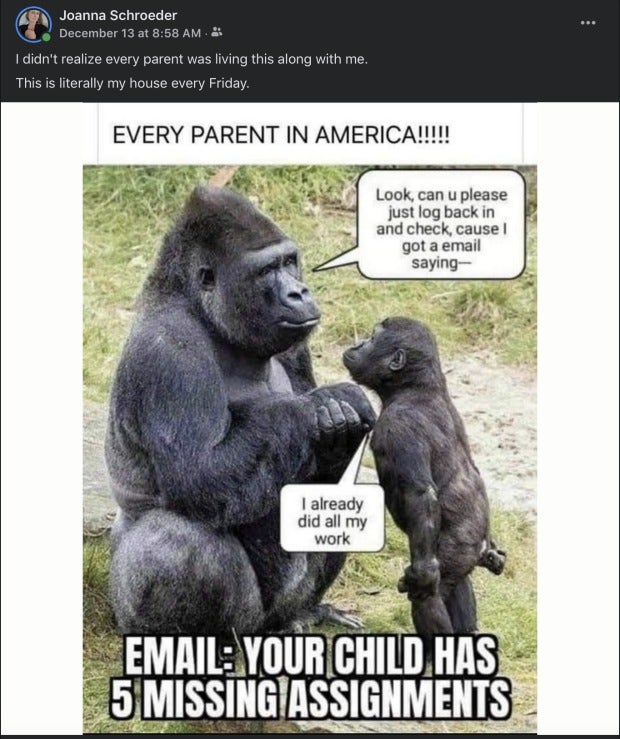How Those 'Your Child Has Missing Assignments' Emails May Be Harming Our Kids
Your child has 5 missing assignments — but don't worry, you're not alone!
 Getty
Getty Every Friday since my kids began distance learning, I receive two emails from Google Classroom. They are automated, so they come at the same time and have the same subject line.
I open these with great trepidation. They list the child's missing assignments first and upcoming assignments below that.
These emails are a great opportunity to look at what the kids having coming up and I understand why the school sends them, but they are a huge source of stress. That's becaue distance learning makes school ridiculously complicated.
There has never — in my kids' entire exprience with online learning during the Covid-19 pandemic — been a week when I didn't receive an email about incomplete work.
There is always a missing assignment. Always.
Often it's due to my middle son's math class, which requires no less than five (5!!) steps to hand in his work.
He has to open a new Google doc, take a photo of the work he did with paper and pencil, load the photo into the Google doc, share the doc with his teacher, mark the assignment as complete in Google Classroom and then place the assignment in something called an e-binder.
This is madness!
Every Friday afternoon, my kids ask, "Did you get the email yet?"
They know that, no matter how much work they did the past week, no matter how many hours they spent sitting in front of a computer alone in a room, they will likely have to head back to their desks to play forensic detective, digging up the details of what's missing, what went wrong, and how to fix it.
When I open an email and the "missing work" section is blank, I literally shout with joy. "You have zero missing assignments!" I might yell to one of them.
That child will likely offer a "woo hoo" to humor me while the other child waits patiently for their news, which is often bad.
Usually the missing assignment is due to the fact that they simply forgot to click "assignment completed" or something equally annoying, but there are times when they just lost track off what was due.
I thought I was alone in my "missing assignments" nightmare until a friend on Facebook shared a meme featuring a mom chimpanzee and her little baby chimp.
Although my own little baby chimps are both taller than me now (at least the ones in school), the meme relfects exactly my family's experience with distance learning.

It reads:
"Every parent in America!" at the top.
Then, "Email: Your child has 5 missing assignments," at the bottom.
The mom chimpanzee asks her kid to log in and check, and the little chimp replies, "I already did all my work".
The meme is so cute because the little chimp stands with clenched fists like any angry elementary student would. Beyond that, it's just so relatable!
I shared the meme on my own Facebook page and got dozens of replies from friends and family — including families with children who are impressive over-achievers who are thriving during distance learning. I was shocked.
I even said, "No, not your child!" to one of the parents.
"Yes, even her!" the parent of a likely future valedictorian replied.
In an instant, with the help of a monkey meme, I felt less alone.
Learning that my family isn't the only one struggling with the "missing assignments" email plague was a huge relief and I told my kids as much.
But then another realization hit me. What are we doing to these kids?
The frequency of missed assignments (and these emails) during distance learning has stressed a lot of kids out.
For some, they just want to give up. They're overwhelmed, frustrated, and they may even start to question whether they're even "good" at school in the first place.
They feel like they're always in trouble.
Sure, distance learning is a gift. We've been able to keep our kids safe at home during this pandemic. Teachers and administrators have worked tirelessly trying to innovate solutions to the massive challenges that arose when we first tried to learn from home in March.
Teachers had to learn new computer and communication skills overnight, things they definitely were not taught in college or in their graduate programs.
Public schools, overall, have done a beautiful job on small budgets. They've handed out Chromebooks and portable hotspots so that every child has an opportunity to participate. They've organized massive free or reduced price lunch and breakfast services so kids who rely on school lunch don't go hungry.
But the universality of the "missing assignments" emails opens up two serious issues with our system.
First, what about all the kids whose parents don't regularly access email, or who simply don't have the time or bandwidth to chase down every missing assignment with their child? How much further will the child fall behind with these limitations?
If they were in the classroom, those kids would have the opportunity to have a conversation with the teacher, sit down with them on lunch break or during a study period, and catch up on their work.
But in the distance learning format, a child's ability to catch up on missing work is limited by their parents' interest or ability to do the often tedious work of figuring out what the teacher wants and how to get it handed in.
The second issue is a matter of self-esteem.
What happens to our kids' self-worth every time we shout, "Why are you missing so many assignments?!"
What do they think and feel, being called out like that every single week?
I know, on a personal level, that seeing missing assignments in that weekly email is frustrating and that probably comes out in my tone no matter how hard I try not to let it.
My irritation with the teachers whose systems are overly complicated is likely displaced onto my child, too, along with my frustration with distance learning and the pandemic, in general.
I have apologized to my kids for being annoyed. I have told them that I know they're doing their best and working hard. But still that tone creeps into my voice.
Somewhere inside, I just want them to do it right, every single time, without needing me to follow up.
But that's an unrealistic goal for any child, especially in elementary and middle school.
Middle school, in particular, is a time in which kids learn how to develop organizational systems that keep them current with their work. This is hard enough in person, let alone at home with multiple online learning platforms that vary by teacher and differing levels of expectations.
Sure, for some kids, being home can be an absolute blessing, as I wrote for The New York Times in the fall. My oldest child is thriving at home with all his materials in one place and very few distractions around him.
But for most kids, I sense there are going to be long-term consequences due to the complicated distance learning systems we've forced on them. For my kids, I bet there will be a fear and anxiety that even when they are doing their work, everything could be undermined by one minor mistake.
For others, there will likely be dramatic losses in learning compared to their classmates whose parents were privileged enough to be able to help them follow through with their work.
Some of these effects are already being detected.
A study of 20,000 students in Washington DC, conducted by a non-profit, found that the achievement gap is widening during distance learning. DC students are "in a learning slide," the report warns.
"DC students have lost four months of learning in math and one month of learning in English language arts. The results are particularly stark for at-risk students, highlighting a growing achievement gap."
There's no doubt in my mind that this learning slide is happening all over the country, and sadly, there are no perfect answers, since pushing kids back into the classroom early also has its downsides, including risking the lives of students and their families.
I have been grateful for distance learning as a way to keep my family safe from Covid infection. I respect the families that chose differently, but I have been happy with our district's choice to focus on remote learning.
But I do believe that our entire educational system will need to look at the school terms that have been (and will be) affected by the pandemic and do yet another reassessment of goals. They will need to shift what needs to be shifted in order to pull every single student up who may have fallen behind.
They will also need to figure out systems to help help kids adjust to in-person learning once again without punishing kids for habits they've gotten into while being home, such as listening to music while doing quiet work, moving around the classroom, wiggling and fidgeting, and even eating in class.
By the time this pandemic is over, the world as we knew it will have changed. We need to accept that change and let go of systems from the past that simply don't make sense now.
Expecting kids who've been distance learning to return to education-as-usual will only do more harm.
And as parents, we need to go easy on our kids. Not just now, not just when we get those annoying "missing assignments" emails, but also when they transition back to classrooms.
Change is hard, it always has been. Every time their educational setting changes, it's stressful and makes it harder to learn while they adjust.
We need to remember to extend them grace, be compassionate about the ways in which remote learning may have affected their self-esteem and social skills, and we need to take some of the pressure off our families.
College-bound teens, in particular, already face immense pressure to be the so-called perfect candidates for college admission. If we jump right back into that hamster wheel of activities, study groups, SAT practice tests, sports, and endless homework, we may seriously harm our kids.
None of this has been easy, and it's not going to be easy for a while. But I know for myself and my kids that the best thing I can do is take a deep breath and remember that my kids don't have to be perfect.
They need to work hard and be honest, kind people. That's what we value most in our house. We need to build their self-esteem and remind them of what really matters.
Beyond that, I have to have faith that they will be OK — even if, every week, I get an email saying one of my children has missing assignments.
Joanna Schroeder is a feminist writer and media critic with a degree in gender studies from UCLA. Her writing has appeared in The New York Times, Time, Redbook, Cosmopolitan, BuzzFeed, Esquire, Vox, and more. Follow her on Twitter for more.

